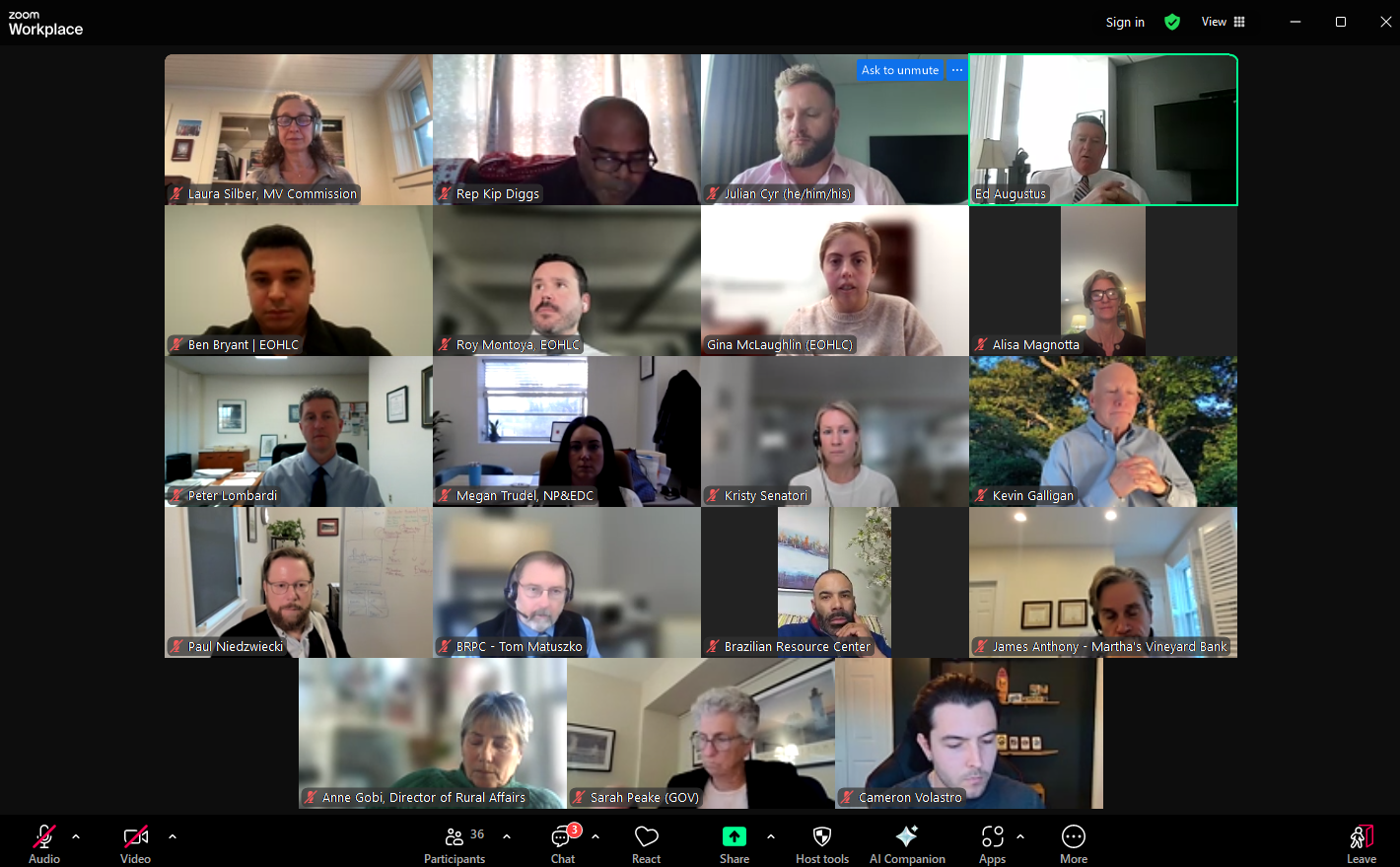- Executive Office of Housing and Livable Communities
Media Contact
Kevin Connor, EOHLC

BOSTON — Members of the newly created Seasonal Communities Advisory Council were sworn in on Thursday, marking an important step toward helping seasonal communities and the workforces that support them with their housing needs.
Created as part of the Affordable Homes Act signed by Governor Maura Healey in August, the Seasonal Communities designation and the creation of the Seasonal Communities Advisory Council are intended to allow for the creation of programs and resources specifically for communities with substantial seasonal variations in employment and housing needs, such as communities on Cape Cod, the Islands and parts of the Berkshires.
“While we work to make housing more affordable across the state, we also recognize that some communities face added headwinds caused by significant fluctuations in seasonal employment,” said Ed Augustus, secretary of the Executive Office of Housing and Livable Communities. “The creation of the Seasonal Communities designation and this council is a big first step toward giving these communities more tools to support housing for the workforces that make these towns special.”
The council will provide advice and recommendations on policies or programs that could benefit seasonal communities, including specialized grant programs and best practices to incentivize production of year-round housing. The council will be required to submit an annual report no later than December 31 each year to the Executive Office of Housing and Livable Communities and the Legislature.
Some of the tools seasonal communities could use include acquiring year-round housing occupancy restrictions, developing housing with a preference for municipal workers, establishing a Year-Round Housing Trust Fund to create and preserve affordable and attainable housing for year-round residents, creating year-round housing for artists, allowing seasonal communities to develop a comprehensive housing needs assessment, allowing tiny homes to be built by-right and used as year-round housing and increasing the property tax exemption for homes that are the owners’ primary residence.
The council consists of members from Cape Cod, Nantucket, Martha’s Vineyard and Berkshire County and is chaired by Secretary Augustus, and members will serve two-year terms. The council met virtually and will hold two in-person meetings in the spring – one in the Berkshires and another on the Cape or Islands. In addition, the Executive Office of Housing and Livable Communities will schedule regional listening sessions where the public will have opportunities to be heard.
In its first meeting the council reviewed and adopted bylaws, discussed the Seasonal Communities provision, including what the law allows included communities to do. Members also expressed a desire to examine the list of communities included with the potential of expanding the designation to additional communities on Cape Cod or in the Berkshires.
In order to receive a Seasonal Communities designation, a community must meet the criteria outlined in the law. That criteria includes all municipalities in the counties of Dukes and Nantucket counties as well as all municipalities with more than 35 percent seasonal housing units in Barnstable County and more than 40% seasonal housing units in Berkshire County. The Executive Office of Housing and Livable Communities has determined that an initial 25 communities automatically fall under those criteria. They are:
Barnstable County: Brewster, Chatham, Dennis, Eastham, Harwich, Orleans, Provincetown, Truro and Wellfleet.
Berkshire County: Alford, Becket, Hancock, Monterey, Mount Washington, Otis, Stockbridge, and Tyringham.
Dukes County: Aquinnah, Chilmark, Edgartown, Gosnold, Oak Bluffs, Tisbury and West Tisbury.
Nantucket County: Nantucket.
Additional communities can be added to this list. The Affordable Homes Act lists criteria for to consider in order to designate additional communities as seasonal. These criteria include:
- High rates of short-term rentals in relation to the overall housing inventory;
- Significant population increases in seasonal visitors;
- Excessive disparities between the area median income and the income required to purchase the municipality’s median home price;
- Percentage of housing stock that is used for seasonal, occasional or recreational use or is otherwise not used as a primary residence by the property’s owner; and
- High variations in the average monthly variation of employment in the sector over the full year, in relation to the municipality’s minimum employment threshold.
The Executive Office of Housing and Livable Communities will work with the Seasonal Communities Advisory Council to develop guidance or regulations on how to designate additional communities as seasonal communities.
The Seasonal Communities Advisory Council members in attendance for the first meeting included:
- Secretary Augustus, chairman
- Sen. Julian Cyr, Cape and Islands
- Rep. Kipp Diggs, Cape Cod
- Peter Lombardi, Massachusetts Municipal Association, Brewster
- Alisa Magnotta, Housing Assistance Corporation, Cape Cod
- Kristy Senatori, Cape Cod Commission, Cape Cod
- Laura Silber, Martha’s Vineyard Commission, Martha’s Vineyard
- Thomas Matuszko, Berkshire Regional Planning Commission, Berkshires
- Megan Trudel, Nantucket Planning and Economic Development Commission, Nantucket
- James Anthony, Martha’s Vineyard Bank, Martha’s Vineyard
- Cameron Volastro, Stone House Properties, Berkshires
- Paul Niedzwicki, Cape Cod Chamber of Commerce, Cape Cod
- Kevin Galligan, Orleans Select Board, Cape Cod
- Michael Mecenas, Health Ministry, Inc., Cape Cod
The Executive Office of Housing and Livable Communities may also add new members as the work and expertise needs of the council evolve.
###
